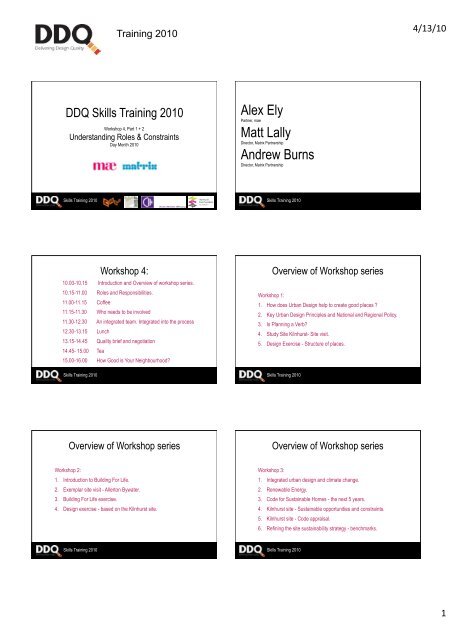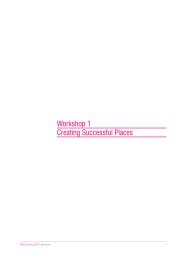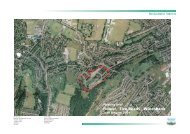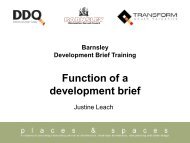Alex Ely Matt Lally Andrew Burns - DDQ - Delivering Design Quality
Alex Ely Matt Lally Andrew Burns - DDQ - Delivering Design Quality
Alex Ely Matt Lally Andrew Burns - DDQ - Delivering Design Quality
You also want an ePaper? Increase the reach of your titles
YUMPU automatically turns print PDFs into web optimized ePapers that Google loves.
Training 2010<br />
4/13/10 <br />
<strong>DDQ</strong> Skills Training 2010<br />
Workshop 4, Part 1 + 2<br />
Understanding Roles & Constraints<br />
Day Month 2010<br />
<strong>Alex</strong> <strong>Ely</strong><br />
Partner, mae<br />
<strong>Matt</strong> <strong>Lally</strong><br />
Director, Matrix Partnership<br />
<strong>Andrew</strong> <strong>Burns</strong><br />
Director, Matrix Partnership<br />
Skills Training 2010<br />
Skills Training 2010<br />
Workshop 4:<br />
10.00-10.15 Introduction and Overview of workshop series.<br />
10.15-11.00 Roles and Responsibilities.<br />
11.00-11.15 Coffee<br />
11.15-11.30 Who needs to be involved<br />
11.30-12.30 An integrated team. Integrated into the process<br />
12.30-13.15 Lunch<br />
13.15-14.45 <strong>Quality</strong> brief and negotiation<br />
14.45- 15.00 Tea<br />
15.00-16.00 How Good is Your Neighbourhood?<br />
Skills Training 2010<br />
Overview of Workshop series<br />
Workshop 1:<br />
1. How does Urban <strong>Design</strong> help to create good places ?<br />
2. Key Urban <strong>Design</strong> Principles and National and Regional Policy.<br />
3. Is Planning a Verb?<br />
4. Study Site Kilnhurst- Site visit.<br />
5. <strong>Design</strong> Exercise - Structure of places.<br />
Skills Training 2010<br />
Overview of Workshop series<br />
Overview of Workshop series<br />
Workshop 2:<br />
1. Introduction to Building For Life.<br />
2. Exemplar site visit - Allerton Bywater.<br />
3. Building For Life exercise.<br />
4. <strong>Design</strong> exercise - based on the Kilnhurst site.<br />
Workshop 3:<br />
1. Integrated urban design and climate change.<br />
2. Renewable Energy.<br />
3. Code for Sustainable Homes - the next 5 years.<br />
4. Kilnhurst site - Sustainable opportunities and constraints.<br />
5. Kilnhurst site - Code appraisal.<br />
6. Refining the site sustainability strategy - benchmarks.<br />
Skills Training 2010<br />
Skills Training 2010<br />
1
Training 2010<br />
4/13/10 <br />
Kilnhurst: Case study<br />
1. Roles and<br />
Responsibilities:<br />
Skills Training 2010<br />
Skills Training 2010 Skills Training 2010<br />
1. Strong Client Leadership<br />
2. Enough Time at the Right Time.<br />
Skills Training 2010<br />
Skills Training 2010<br />
2
Training 2010<br />
4/13/10 <br />
3. Learn from Other Projects.<br />
A Knowledge Base<br />
Foresight Insight Hindsight<br />
Look at………<br />
1. Buildings<br />
2. Case Studies<br />
3. Building Sites<br />
4. CABE Digital Library<br />
5. Books and Magazines<br />
Talk to………<br />
1. Other clients<br />
2. Your board<br />
3. Users<br />
4. <strong>Design</strong>ers<br />
5. Project Managers<br />
6. Facilities Managers<br />
Skills Training 2010<br />
Skills Training 2010<br />
Overview of Workshop series<br />
Firmness - will it last?<br />
Learn from Your Own and Other<br />
Successful Projects<br />
Functionality - does it work?<br />
Delight - does it look good?<br />
Skills Training 2010<br />
Skills Training 2010<br />
4. Develop a clear brief.<br />
VISION STATEMENT<br />
OUTLINE BRIEF<br />
DETAILED BRIEF<br />
Stakeholder Input<br />
1. Identify all relevant stakeholder groups.<br />
2. Ensure spokesperson is truly representative.<br />
3. Listen properly, and understand.<br />
4. Provide clarity.<br />
SPECIFICATION<br />
BUILDING MANUAL<br />
Skills Training 2010<br />
Skills Training 2010<br />
3
Training 2010<br />
4/13/10 <br />
5. Realistic Financial Commitment<br />
1. Cost per meter sq - Build cost, land cost, on-cost.<br />
2. Grant.<br />
3. Viability.<br />
…..Too Expensive…..<br />
1. This frequently happens.<br />
2. Don’t worry, this is where your creativity can come in.<br />
3. Avoid reducing quality, it will usually cost you more in the end.<br />
4. Go back to the brief. Target outcome, operational<br />
management, space needs.<br />
5. Is there scope for further optimisation and overall space<br />
reduction?<br />
6. Creative thinking.<br />
Skills Training 2010<br />
Skills Training 2010<br />
6. Adopt integrated processes<br />
Collaborate with external partners<br />
Planning Policy<br />
Development Control<br />
Housing<br />
Conservation/ Urban <strong>Design</strong><br />
Urban Regeneration<br />
Highways<br />
Skills Training 2010<br />
Skills Training 2010<br />
7. Find the right people for the job.<br />
Stakeholders<br />
Specialist Advisers<br />
Encourage and consult your team<br />
CLIENT Team<br />
<strong>Design</strong> Team<br />
Project Sponsor<br />
Independent<br />
Advisor<br />
Project Manager<br />
<strong>Design</strong><br />
Champion<br />
Facilities<br />
Manager<br />
The Board<br />
Construction Team<br />
Staff<br />
<strong>Design</strong> and Construction<br />
consultants and advisers<br />
Board Members<br />
Finance, Legal, HR, IT etc.<br />
Skills Training 2010<br />
Skills Training 2010<br />
4
Training 2010<br />
4/13/10 <br />
8. Respond to the Context.<br />
9. Commit to Sustainability.<br />
1. Think outside the “red line”.<br />
2. Revitalise and regenerate.<br />
3. Connect and include.<br />
1. Location and access.<br />
2. Materials - robust, non-toxic, easy maintenance.<br />
3. Energy efficiency.<br />
4. Recycling.<br />
5. Biodiversity.<br />
Skills Training 2010<br />
Skills Training 2010<br />
10. Sign off all Key Stages.<br />
Skills Training 2010<br />
Skills Training 2010<br />
Who needs to be involved?<br />
2. The integrated team:<br />
the right structure to deliver<br />
Skills Training 2010<br />
© Matrix Partnership Ltd<br />
5
Training 2010<br />
4/13/10 <br />
An engaging process<br />
A collaborative approach<br />
• Community and stakeholder<br />
engagement integrated into<br />
each stage of the process<br />
• A collaborative approach can<br />
emerge out of a shared vision<br />
• Benefits of ‘Enquiry-by-<br />
<strong>Design</strong>’<br />
Skills Training 2010 Skills Training 2010<br />
© Matrix Partnership Ltd<br />
An integrated team<br />
• An integrated spatial<br />
masterplan requires an<br />
integrated design team<br />
• Bringing specialist<br />
disciplines together<br />
The masterplanning team<br />
Core specialisms<br />
• Masterplanning + urban design<br />
• Town planning<br />
• Architecture<br />
• Landscape design<br />
• Engineering – partic. transport<br />
• Economic appraisal, funding + delivery<br />
Skills Training 2010<br />
Skills Training 2010<br />
The masterplanning team<br />
Additional skills<br />
• Project management<br />
• Additional engineering (eg. energy, structural, civil)<br />
• Cost planning / QS<br />
• Community development / consultation<br />
• Environmental specialists (eg. EIA, ecologists)<br />
• Conservation specialists<br />
• Industry sector consultants (eg. cultural, leisure)<br />
<strong>Delivering</strong> integrated<br />
solutions<br />
Skills Training 2010<br />
© Matrix Partnership Ltd<br />
Skills Training 2010<br />
6
Training 2010<br />
4/13/10 <br />
The benefits of an integrated approach<br />
Well integrated three-dimensional design can ensure:<br />
• Clarity of intention<br />
• Proposals based on robust analysis<br />
• Delivery-related issues addressed from outset<br />
• All specialist stakeholder concerns considered<br />
• Well balanced mix and variety of accommodation<br />
• Potential land use efficiencies<br />
• Reduced cost of site preparation and infrastructure<br />
• Increased take up of sustainable systems<br />
3. The case study site:<br />
the story so far<br />
Skills Training 2010<br />
© Matrix Partnership Ltd<br />
© Matrix Partnership Ltd<br />
The Kilnhurst site.<br />
The Kilnhurst site.<br />
Skills Training 2010<br />
Skills Training 2010<br />
Draft Spatial Masterplan.<br />
Draft Spatial Masterplan.<br />
Concept<br />
• Hierarchy of place<br />
• Connections<br />
• Use concentrations<br />
• Relationship<br />
between built and<br />
open space<br />
Detail<br />
• Urban Grain<br />
• Block formation<br />
• Public space type<br />
• Street type<br />
© Matrix Partnership Ltd<br />
© Matrix Partnership Ltd<br />
Skills Training 2010<br />
Skills Training 2010<br />
7
Training 2010<br />
4/13/10 <br />
Summary of analysis - Workshop 1.<br />
Summary sketch - integrated layers of thinking.<br />
• Restricted access<br />
• Railway on embankment<br />
• Industrial neighbours<br />
• Potential contamination<br />
• Aspiration to connect<br />
• Potential to define routes by blocks<br />
• Expose edges to the good views<br />
• Open a space along the canal<br />
• Create an open grid<br />
• Potential flood<br />
Skills Training 2010<br />
Skills Training 2010<br />
Assessment tools - Workshop 2.<br />
Define street network and block structure.<br />
© Matrix Partnership Ltd<br />
Skills Training 2010<br />
Skills Training 2010<br />
Perimeter block: public fronts - private back.<br />
• Rule of thumb: circa 10m building depth + 20m back-to-back<br />
residential / modern office up to 16m)<br />
© Matrix Partnership Ltd<br />
Skills Training 2010<br />
Skills Training 2010<br />
8
Training 2010<br />
4/13/10 <br />
• Distinct character, integrated with<br />
unique landscape value<br />
• Maximise views and waterfront<br />
• Hierarchy of streets and nodes<br />
• Ease of movement- links to town and<br />
canal<br />
• Focal points<br />
Summary of Project Aspirations.<br />
• Diversity and adaptability<br />
• <strong>Quality</strong> of public space<br />
Skills Training 2010<br />
Summary of Project Aspirations.<br />
Skills Training 2010<br />
Town meets countryside<br />
Analysis of Masterplan.<br />
Key Contributions to Masterplan.<br />
• 368 dwellings<br />
• 23,000sq.m commercial<br />
• Site Area=15 hectares<br />
• Residential Area= 9.6 hectares<br />
• POS= 3.2 hectares (20% of<br />
site area)<br />
• Residential Density= 40 dph<br />
Skills Training 2010<br />
Skills Training 2010<br />
Key Contributions to Masterplan.<br />
Key Contributions to Masterplan.<br />
Skills Training 2010<br />
Skills Training 2010<br />
9
Training 2010<br />
4/13/10 <br />
Key Contributions to Masterplan.<br />
Key Contributions to Masterplan.<br />
Skills Training 2010<br />
Skills Training 2010<br />
Key Contributions to Masterplan.<br />
Workshop 3 –<br />
A sustainable plan ?<br />
Skills Training 2010<br />
Skills Training 2010<br />
Who does what when?<br />
Lunch anyone ?<br />
Skills Training 2010<br />
Skills Training 2010<br />
10
Training 2010<br />
4/13/10 <br />
1. Why is a project brief needed?<br />
4. What makes a<br />
good brief?<br />
quality briefs lead to quality places<br />
A clear project brief = key ingredient for effective and efficient<br />
working between commissioning body and masterplanning team.<br />
Often a key tender document – a set of instructions and basis for<br />
comparison.<br />
© Matrix Partnership Ltd<br />
1. Why is a project brief needed?<br />
1. Why is a project brief needed?<br />
The brief confirms:<br />
+<br />
• the context for the work<br />
• the scope of work<br />
• aims and objectives<br />
• specific priorities and issues of concern<br />
• the broad principles of the approach to be adopted<br />
• specified outputs<br />
• a statement on budget, timescale and management<br />
Skills Training 2010<br />
© Matrix Partnership Ltd<br />
2. Good practice brief writing: Top tips<br />
2. Good practice brief writing: Top tips<br />
• succinct and clear - focussed on how services add<br />
value and expertise needed<br />
• Background information - summarised in appendices<br />
and cross-referenced<br />
• Aims and objectives should be few and precise - helps<br />
clarify thinking, identifies priorities and common ground<br />
• Strike balance between demanding robust<br />
methodology and avoiding over-prescription<br />
In a competitive process invite:<br />
• innovation and added value<br />
• an explanation of a rationale for the approach and how<br />
this affects outputs<br />
• consistency of format and content for comparison<br />
Skills Training 2010<br />
© Matrix Partnership Ltd<br />
Skills Training 2010<br />
© Matrix Partnership Ltd<br />
11
Training 2010<br />
4/13/10 <br />
3. Management of the commission<br />
4. Scope of contents<br />
• Day-to-day management of masterplan/brief led by<br />
experienced person able to dedicate time<br />
• May or may not be the client responsible for overall<br />
project (often helps to have dedicated resource)<br />
• Manager needs to have necessary time and authority<br />
to take responsibility, and team management skills to<br />
lead<br />
1. Introduction / context<br />
- Overall purpose<br />
- Partners and funding<br />
- Policy framework<br />
- Main sources of info<br />
- Related studies<br />
- Other stakeholders<br />
- Physical area<br />
2. Vision, aims and objectives<br />
- What are the drivers?<br />
- Principal outputs?<br />
- Outline business case?<br />
Skills Training 2010<br />
© Matrix Partnership Ltd<br />
Skills Training 2010<br />
© Matrix Partnership Ltd<br />
4. Scope of contents<br />
4. Scope of contents<br />
3. Description of methodology<br />
- Overall approach<br />
- Main stages and tasks<br />
- Skills required<br />
- Interim and final outputs<br />
- Scope of consultation / engagement<br />
- Management arrangements<br />
4. Expectations for reporting<br />
- Outline main contents<br />
- Specify particular elements / format<br />
5. Details of budget and timetable<br />
- Identify budget if appropriate (often benefits all parties)<br />
- Make provision for costs<br />
- Contingency?<br />
- Key milestones<br />
- Sign-off / adoption arrangements<br />
- Start and completion dates<br />
6. Management arrangements<br />
- Instructions for management<br />
- Steering group?<br />
- Confirm interview panel and evaluation arrangements<br />
Skills Training 2010<br />
© Matrix Partnership Ltd<br />
Skills Training 2010<br />
© Matrix Partnership Ltd<br />
4. Scope of contents<br />
7. Description of the tender process, if applicable<br />
- Information to provide<br />
- Selection criteria<br />
- Basis of appointment<br />
- Submission details<br />
5. The tender process<br />
• Determine procurement plan (may require OJEU)<br />
Either:<br />
• Possible two-stage appointment tender<br />
- Stage one: short EOI to evaluate competency<br />
- Stage two: detailed proposals<br />
or<br />
• ‘Long list’ of 6-10 with known skill and experience<br />
Skills Training 2010<br />
© Matrix Partnership Ltd<br />
Skills Training 2010<br />
© Matrix Partnership Ltd<br />
12
Training 2010<br />
4/13/10 <br />
5. Negotiation and<br />
Success<br />
More Tea Vicar ?<br />
© Matrix Partnership Ltd<br />
Skills Training 2010<br />
Urban <strong>Design</strong> Principles<br />
6. How good is your<br />
neighbourhood<br />
Character<br />
Continuity and enclosure<br />
<strong>Quality</strong> of public spaces<br />
Ease of movement<br />
Legibility<br />
Adaptability<br />
Inclusivity and diversity<br />
Sustainability<br />
© Matrix Partnership Ltd<br />
Skills Training 2010<br />
Urban <strong>Design</strong> Principles<br />
Character and distinctiveness: should have its own<br />
identity<br />
Consider:<br />
Landscape,local building forms,distinctiveness natural features,<br />
settlement patterns, sky lines, streetscape.<br />
Urban <strong>Design</strong> Principles<br />
Continuity and enclosure: public and private should be<br />
clearly distinguished<br />
Consider:<br />
Building lines, enclosure and comfort, fronts and backs, active<br />
frontages and ‘eyes on the street’<br />
Skills Training 2010<br />
Skills Training 2010<br />
13
Training 2010<br />
4/13/10 <br />
Urban <strong>Design</strong> Principles<br />
<strong>Quality</strong> of public spaces: should have attractive and<br />
successful outdoor areas<br />
Consider<br />
Boundaries, thresholds, management, public art, transparency,<br />
activities, animation<br />
Urban <strong>Design</strong> Principles<br />
Ease of movement: easy for everyone to get to and move<br />
through - connectivity and permeability, people before cars<br />
Consider<br />
Movement network, traffic calming and management, development<br />
block size, public space, visual and other interest<br />
Skills Training 2010<br />
Skills Training 2010<br />
Urban <strong>Design</strong> Principles<br />
Legibility: has a clear image and is easy to understand<br />
Consider<br />
Memory, orientating yourself, knowing where you are, focal points,<br />
views and vistas, lighting, colour, public art, ‘place’<br />
Urban <strong>Design</strong> Principles<br />
Adaptability: able to change easily<br />
Consider<br />
Built in flexibility and re-use, floor to ceiling heights, ground floor<br />
uses, ‘long life loose-fit’, home-working, multiple use, diurnal<br />
potential<br />
Skills Training 2010<br />
Skills Training 2010<br />
Urban <strong>Design</strong> Principles<br />
Inclusivity and diversity: for everyone, without special<br />
treatment, values difference<br />
• Consider<br />
Choice and opportunity, mix of uses and management, night time /<br />
day time economy<br />
Urban <strong>Design</strong> Principles<br />
Integration and efficiency - sustainability integrating land<br />
uses and transport, energy resource efficiency, carbon<br />
reduction<br />
Consider<br />
solar orientation, energy conservation, ecology, renewables and<br />
recycling, waste management, cycling and walkability<br />
Skills Training 2010<br />
Skills Training 2010<br />
14
Training 2010<br />
4/13/10 <br />
<strong>DDQ</strong> Skills Training 2010<br />
Workshop 4<br />
Working together<br />
Understanding roles and constraints<br />
20 th April 2010<br />
15






